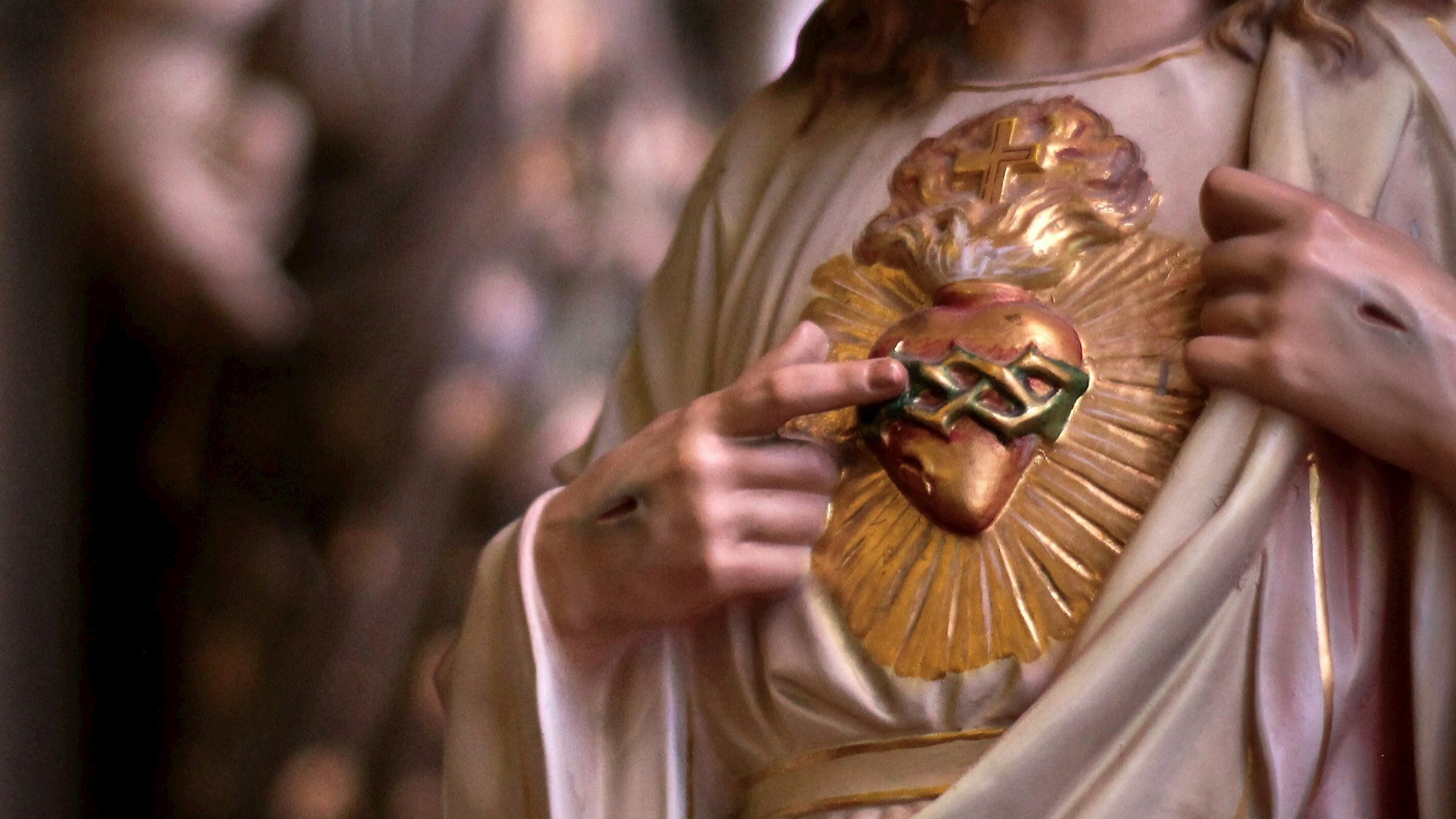In new pastoral letter, Archbishop Vigneron calls parishes, schools to help individuals embrace God-given 'gift of one's identity'
DETROIT — Those who experience the struggle and pain of gender confusion are near to Christ’s heart, and thus near to the heart of the Church, which out of compassion reaches out to offer Christ’s perfect love, truth and wholeness for them, Archbishop Allen H. Vigneron said in a new pastoral letter.
In his new teaching document, “The Good News About God’s Plan: A Pastoral Letter on the Challenges of Gender Identity,” the archbishop addresses the sensitive topic of gender confusion, presenting the Church’s wisdom and seeking to accompany families, parishes and schools as they offer pastoral care in “clarity and charity” to those struggling with their God-given identity.
The archbishop spoke to the “challenges of our time” presented by a “divided and separated” vision of the human person that denies “God’s immutable gift of one’s identity as a man or a woman,” which has resulted in pain, confusion and brokenness in the world.
These modern ideologies obscure the love God has for each of his children, but the beauty of the Church’s teaching — inherited from the revelation of Christ — has something profound to offer each and every hurting soul, the archbishop said.
“Those who struggle with gender confusion are our brothers and sisters. They are sons and daughters of God and beloved members of our communities, never to be condemned nor rejected, but rather welcomed and accompanied on the path to the light of truth,” Archbishop Vigneron wrote.
The pastoral letter, released Feb. 26, is the fifth of the archbishop’s episcopate and the first major letter since 2017’s landmark Unleash the Gospel, which was a response to the Archdiocese of Detroit’s historic Synod 16. Archbishop Vigneron has also released a series of pastoral notes on various teaching topics.
The real pain and distress experienced by those who suffer from gender confusion is made worse by supposed “affirming” treatments that further alienate a person from their authentic identity as designed by an all-loving God, Archbishop Vigneron said.
“(W)e are not byproducts or accidents; we are created,” the archbishop emphasized. “To be created is to be chosen, willed, and intended. And because God is all-knowing, we were chosen from all eternity. From the beginning of time, you and I were chosen and willed into being by the God of all creation.”
The nearly 5,000-word letter contrasts the Christian vision of the human person as uniquely created in God’s image with an alternate, “dualist” vision of mankind that views the body as divided from the soul, as an object to be used and manipulated, without inherent dignity or value.
This “shallow and impoverished” view of the human person shortchanges those who suffer from gender confusion, who are led to believe the path to fulfillment and happiness lies in acting contrary to their nature, or worse, in mutilating their bodies in often irreversible ways, the archbishop said.
“Being made in the image and likeness of God bestows upon us a human dignity which cannot be earned and can never be lost,” the archbishop said. “This human dignity is what allows us to seek and find the most fundamental truths about who we are, why we were made, what it means to live a good life, and the nature of our eternal destiny.”

That God created human beings “male and female” speaks to a deeper purpose for their creation, the archbishop said, namely, that they are called to be “co-creators” who use that gift to reflect God’s love. This gift can be seen in the complementarity of man and woman, who by the gift of their sexuality rightly expressed through marriage, cooperate with God in creating new life.
It is in this created identity — even for those not called to marriage — that man and woman find their deepest fulfillment and purpose as sons and daughters of God, infinitely loved by Him, the archbishop said.
Because of this, human beings are not given “limitless autonomy” to change what God has created, even when it comes to one’s own body, he said.
“We are not simply another thing that has been made; rather, we are set apart from the rest of creation. Nothing else is made in God’s image like human beings,” he said. “After each day of creation, God looks at what he has made and calls it good. After the pinnacle of his earthly creation — man and woman — he declares this creation to be very good (Gen. 1:31).”
As such, one’s identity as a man or a woman is an integral part of who each person is — and no alternative could satisfy our deepest longing for happiness and fulfillment as intended by our Creator, he said.
“We are not disjointed, with a separation between our bodies and our identities,” he said. “Rather, our bodies reveal to us and to others key aspects to understanding who we are.”
These realities do not minimize the fact that many people experience deep confusion and distress over their sexual and bodily identities, Archbishop Vigneron said. However, modern attempts to soothe this distress through “gender affirming” therapy, hormones, surgical procedures, or new names and pronouns grievously miss the mark — especially when those suffering are children, he said.
“The pain of numerous people harmed by this gender ideology is real. That pain is made greater when people who suffer are encouraged to reject their innate identity as male or female and to renounce the moral law written in their hearts,” Archbishop Vigneron said.
The Church’s heart breaks for those who suffer from this pain and disjointedness, and seeks to “help our brothers and sisters find the fullness of human flourishing that Christ desires for them,” the archbishop said.
“It is difficult to imagine a clearer distortion of this flourishing than the case of a young person who is misled into thinking it is possible to change his or her bodily identity and that it is good to attempt to do so, taking drastic, irreversible steps to try to accomplish this change,” Archbishop Vigneron wrote.
“Indeed, a growing number of people who have attempted to change their sex later profoundly regretted doing so, with many attempting to undo the damage by ‘detransitioning’ back to their biological sex, often with serious complications and trauma caused by hormone blockers or, worse, the permanent mutilation of their bodies through surgical intervention,” he continued.
Those suffering from gender confusion deserve love and support from the Christian community — not a cheap, sentimental love that avoids difficult conversations, but a deep, abiding love that sees and accompanies a person as Christ himself would, the archbishop said.
“We must lovingly accompany them by acknowledging their pain, listening to them, making sure they know they are heard, and assuring them of God’s personal love for them. Too often in our efforts to share the Good News we can lose sight of the good which comes from authentic accompaniment of individuals in pain,” he said. “Stock answers or trite phrases often fall harmfully short. The suffering of those with gender confusion can be an isolation from oneself, which can be intensely destabilizing.”

Loved ones — especially parents — of those experiencing gender confusion may feel helpless and fear alienating or driving their child to self-harm if they don’t affirm his or her chosen gender, the archbishop said.
However, through listening and radical compassion — coupled with an understanding of the healing and wholeness Christ seeks to give to his son or daughter — parents can affirm the goodness of God’s design while at the same time being supportive and loving, he said.
“Parents and families need to know that they have a special mission which includes radical love and radical commitment to the truth of the Gospel, affirming the goodness of the human body as created by God,” Archbishop Vigneron said.
Catholics must be cautious not to become “culture warriors” looking for a “battle against those with whom we disagree,” yet neither should followers of Christ “be bullied into silence or cowered by the volume of voices who propose a disjointed view of reality,” the archbishop said.
“Rather, we must steadfastly and lovingly proclaim with conviction the Gospel that each and every person’s body, as created, is made in God’s image and likeness, and therefore possesses an inviolable dignity,” he said.
Ultimately, such a view of the human person isn’t merely intellectual, Archbishop Vigneron said, but enlivened by an encounter with the God who became human out of radical love for His creation.
“God’s great act of love is his union with the human race — in a body,” the archbishop said. “He ‘took on flesh,’ and then, in his body, suffered and died for us.”
Jesus unites himself to us through the Cross, and even now possesses his wounded and glorified body in heaven, he said.
“When we seek to accompany those who are hurting, we do so with the confidence that Jesus knows and understands their suffering,” the archbishop said. “He does not know this in a distant or merely theoretical way. In taking on our flesh, he unites himself to all the suffering in the world and, therefore, knows deeply in himself all the wounds we each experience.
“Our love and compassion are rooted in our experience of Jesus’s love for us and our letting him love others through us,” he added. “Jesus’s compassion ultimately leads to wholeness in a way that cannot be experienced apart from him.”

In addition to the catechesis and encouragement to those suffering from gender confusion and their families, the archbishop’s letter introduced new policies for parishes, schools and Catholic organizations in the Archdiocese of Detroit to help them navigate practical issues related to the topic.
Those policies are based on a “singular truth” that everyone affected by gender confusion is a son or daughter of God, called to holiness and invited to a “deep and abiding relationship with God through the Holy Spirit,” the archbishop said.
“This pastoral letter is meant as a condemnation of no one, but as a loving accompaniment to all,” the archbishop concluded. “I hope this helps each of you let the wisdom of the Church form your thinking as you address the issue of gender identity in your communities.”
‘The Good News About God’s Plan: A Pastoral Letter on the Challenges of Gender Identity’
Read Archbishop Allen H. Vigneron’s pastoral letter, “The Good News About God’s Plan: A Pastoral Letter on the Challenges of Gender Identity.” A letter introducing the policies, frequently asked questions and resources in Spanish are also available.
Copy Permalink
Family life











